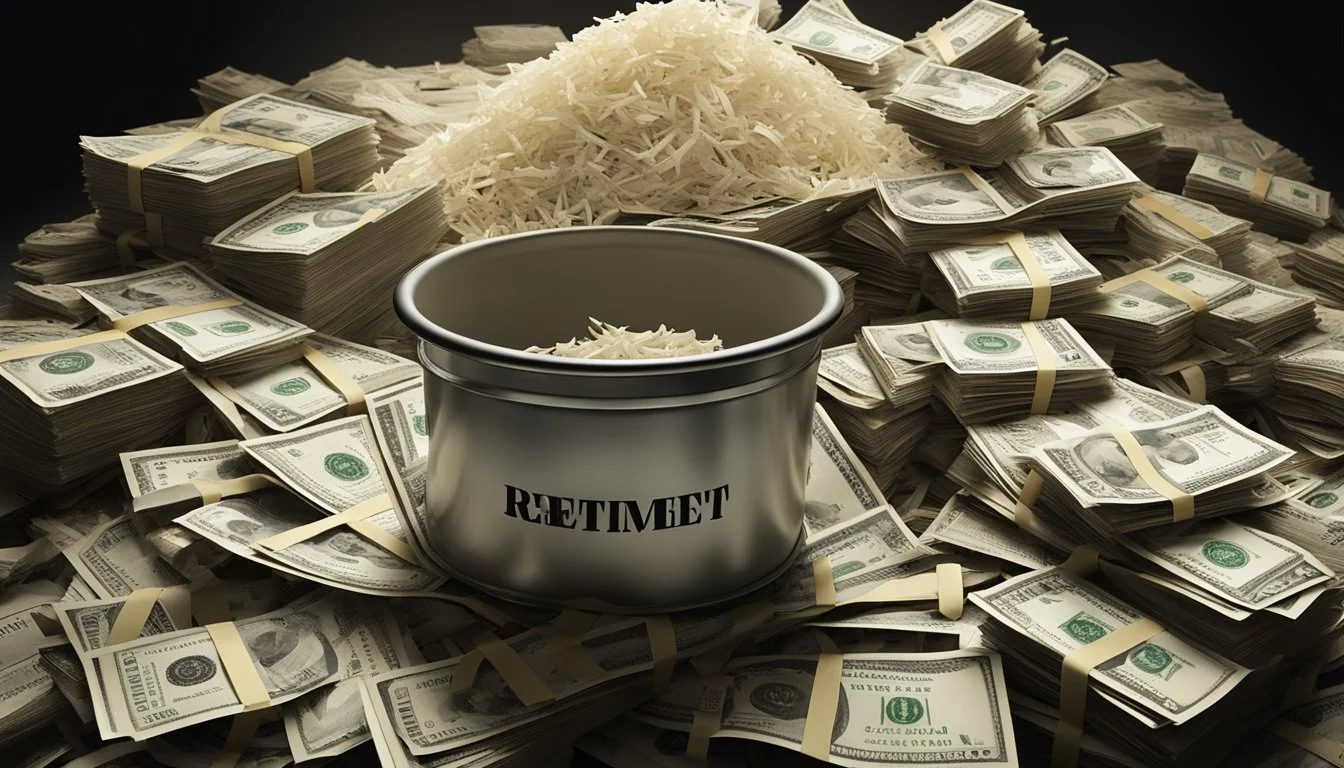10 Riveting Documentaries About Ponzi Schemes Targeting Retirees
An In-Depth Look
Ponzi schemes have long victimized investors with the promise of high returns and minimal risk, but retirees often become primary targets due to their accumulated wealth and perceived vulnerability. By exploiting trust and financial naivety, fraudsters can devastate the savings of those relying on their nest eggs for a secure retirement.
This article highlights ten compelling documentaries that shed light on the intricacies of Ponzi schemes aimed at retirees, offering insight into the fraudulent tactics used and the severe consequences faced by the victims. These documentaries serve as essential viewing for understanding how such scams operate and underscore the importance of vigilance and education in preventing financial exploitation.
1) The Madoff Affair (2009)
"The Madoff Affair" is a documentary that reveals the shocking story of Bernie Madoff's massive Ponzi scheme.
This film examines how Madoff defrauded thousands of investors, including retirees, out of $65 billion. His scheme is considered the largest Ponzi scheme in history.
The documentary explores the intricate details of Madoff's operations and interviews those impacted. Key figures, such as investigator Harry Markopolos, share insights into their efforts to expose the fraud.
The film highlights the regulatory failures that allowed Madoff's scheme to continue unchecked for years. Viewers gain a deeper understanding of the financial world's dark side.
More information about "The Madoff Affair" can be found on PBS's website.
2) Chasing Madoff (2010)
"Chasing Madoff" is a documentary directed by Jeff Prosserman. The film explores the efforts of Harry Markopolos, a former securities analyst, who spent ten years uncovering Bernie Madoff's notorious Ponzi scheme.
Harry Markopolos, along with his team, meticulously gathered evidence and tried to alert the Securities and Exchange Commission (SEC) about Madoff’s fraud. Despite numerous meetings and clear proof, authorities failed to act for many years.
The documentary portrays the immense struggle Markopolos faced, highlighting the complexities and challenges of exposing financial fraud at such a high level. The film features detailed accounts of how Madoff's scheme defrauded investors of an estimated $18 billion, further illustrating the depths of this financial betrayal.
It also shines a light on the inefficiencies and lapses within regulatory bodies, bringing into question the robust nature of financial oversight at the time. For more in-depth information on "Chasing Madoff," viewers can refer to the Wikipedia or IMDb pages.
3) In God We Trust (2013)
"In God We Trust" is a gripping documentary that dives into the personal impact of Bernard Madoff's infamous Ponzi scheme through the eyes of Eleanor Squillari. Squillari was Madoff's personal secretary for 25 years and had a front-row seat to one of the largest financial frauds in history.
The film highlights Squillari's journey for justice and reveals previously unknown facts about the scandal. It's not just a story of financial loss; it’s about betrayal and the shattering of trust.
Directed by Derek Anderson and Victor Kubicek, the documentary provides a unique perspective on Madoff's crime and its effects on those closest to him. Squillari’s deeply personal account makes the complex financial crime relatable and human.
For more information on "In God We Trust," visit the IMDb page.
4) The China Hustle (2017)
The China Hustle is a financial documentary directed by Jed Rothstein. The film uncovers a massive securities fraud by Chinese companies listed on the US stock markets. These companies manipulated financial information to deceive American investors.
The documentary features Dan David and Jon Carnes, two activist shareholders who worked to expose these fraudulent activities. Their investigation reveals how Chinese companies used reverse mergers to enter the US stock market, misleading investors about their financial health.
The film showcases the extent of the fraud and its impact on global markets. It illustrates how the greed and negligence of various stakeholders contributed to one of the biggest financial scandals in recent history.
For more information, check out The China Hustle on IMDb.
5) American Greed: Madoff (2010)
"American Greed: Madoff" delves into the life of Bernie Madoff, the mastermind behind the largest Ponzi scheme in American history. Madoff's scheme defrauded thousands of investors, many of whom were retirees, out of approximately $65 billion.
The documentary provides an in-depth look at Madoff's operations and how he maintained his fraudulent empire for decades. It takes viewers through the investigation, his arrest, and subsequent trial. This episode highlights the devastating impact on his victims.
In addition, the documentary captures Madoff's life after his conviction. He was sentenced to 150 years in prison and began serving his time at Butner Prison in North Carolina. The episode reveals how Madoff adjusted to prison life and how other inmates treated him.
This episode of "American Greed" not only focuses on Madoff but also on the broader implications of such a large-scale financial crime. It provides a sobering reminder of the importance of financial regulation and vigilance.
For more information about "American Greed: Madoff," you can visit its IMDb page.
6) Wizard of Lies (2017)
"The Wizard of Lies" is an HBO film that examines the life and crimes of Bernie Madoff. Directed by Barry Levinson, the film features Robert De Niro as Bernie Madoff.
The movie explores the largest Ponzi scheme in U.S. history, which defrauded investors of nearly $65 billion. This scandal had a profound impact, particularly harming many retirees who had entrusted their life savings to Madoff.
Michelle Pfeiffer plays Ruth Madoff, providing insight into the family's perspective during the unraveling of the scheme. The film delves into the emotional and psychological toll on Madoff’s family.
The narrative details how Madoff's financial misconduct went unnoticed for years. "The Wizard of Lies" also highlights the regulatory failures that allowed the scheme to persist.
For more information, visit IMDB.
7) The Imposter (2012)
This gripping documentary delves into the strange case of a French man, Frédéric Bourdin, who convinced a grieving Texas family that he was their missing teenage son.
Bourdin's deception was so convincing that even authorities were initially fooled. The family's desire to believe overshadowed glaring inconsistencies in his story.
The film explores the psychological complexities of both the impostor and the family, creating a deeply unsettling yet fascinating narrative.
For more information, visit IMDb.
8) Ponzi: The Rise and Fall of a Fraudster
In 1920, Charles Ponzi executed a scheme that would forever bear his name. He promised investors massive returns by trading international postal reply coupons. This seemingly legitimate enterprise unraveled when it became clear that Ponzi was using new investors' funds to pay returns to earlier investors.
Charles Ponzi's charismatic personality and promises of high returns attracted thousands. Within months, he amassed millions of dollars. Yet, as more people invested, Ponzi struggled to maintain the facade, leading to his eventual downfall.
Authorities eventually exposed the scheme, revealing the extent of Ponzi's deceit. He defrauded thousands out of close to $15 million, leading to widespread financial ruin for many of his investors.
Ponzi was arrested, tried, and imprisoned for his crimes. His name became synonymous with financial fraud, and his story serves as a cautionary tale about the dangers of get-rich-quick schemes. His legacy endures as a prime example of the catastrophic impact of unbridled greed and deceit.
For a more detailed look at Charles Ponzi's fraud and its aftermath, this documentary offers an in-depth portrayal of his rise and fall. Ponzi: The Rise and Fall of a Fraudster (Year Unknown).
9) Dirty Money: The Confidence Man (2018)
"Dirty Money: The Confidence Man" is a compelling episode from the Netflix series "Dirty Money."
Directed by Fisher Stevens, this documentary delves into Donald Trump's real estate ventures. It paints a vivid picture of how Trump's business tactics evolved into a powerful brand.
Focusing on financial manipulation, the episode explores Trump's transformation from a series of business failures to becoming a global brand name.
The documentary weaves together various stories, shedding light on the financial strategies Trump employed. This includes leveraging media exposure and navigating through multiple real estate booms and busts.
For more information on "Dirty Money: The Confidence Man" (2018), visit IMDb.
10) Betting on Zero (2016)
"Betting on Zero" focuses on hedge fund manager Bill Ackman and his billion-dollar bet against Herbalife, which he alleges operates as a pyramid scheme. This documentary delves into corporate finance and high-stakes investing.
Directed by Ted Braun, the film explores the complexities of Ackman's crusade. It sheds light on Herbalife's business practices and the impact on those involved.
The documentary presents a tense narrative, balancing corporate intrigue with personal stories from individuals affected by the alleged scheme. Viewers get a front-row seat to the intricacies of short selling and financial activism.
"Betting on Zero" paints a detailed picture of the battle between Ackman and Herbalife, highlighting the broader implications for the financial industry and regulatory bodies.
For more information, visit Betting on Zero on IMDb.
Understanding Ponzi Schemes
Ponzi schemes are elaborate financial frauds that deceive investors with the promise of high returns. These schemes have been practiced globally, with devastating impacts on many, particularly retirees.
Historical Background
Ponzi schemes are named after Charles Ponzi, who in the 1920s orchestrated a massive scam involving postage stamp speculation. He convinced investors to fund his scheme by promising huge returns in a short period. As more people invested, Ponzi used the new investments to pay earlier investors, creating an illusion of profitability.
This fraudulent model was not unique to Ponzi. Over time, similar schemes have appeared in various forms across different countries. From the 1990s internet boom to recent cryptocurrency scams, the fundamental principles remain the same: pay returns to older investors using the money from newer investors.
Common Characteristics
Ponzi schemes share several key characteristics. High returns with little or no risk is a common lure. Scam operators promise consistent, high returns, which are usually not possible with legitimate investments.
Complex strategies and unregistered investments are other red flags. The fraudsters often claim to use sophisticated trading strategies or exclusive investment opportunities. To avoid legal scrutiny, these investments are typically not registered with financial authorities.
Additionally, difficulty in obtaining payments, vague explanations, and a lack of transparency are typical. When investors ask to cash out, delays and excuses are common. The scammers often provide unclear and convoluted explanations about how profits are generated, adding layers of deception.
Notable Ponzi Scheme Operators
Several notorious figures have orchestrated large-scale Ponzi schemes. Bernie Madoff is perhaps the most well-known. Running the largest Ponzi scheme in history, he defrauded investors out of an estimated $65 billion. Madoff's scam collapsed during the 2008 financial crisis, revealing years of deceit.
Zachary Horwitz, an actor, misled investors with fake film licensing deals, swindling $650 million. His scheme, built on convincing investors of lucrative distribution rights, fell apart in 2021.
In the realm of cryptocurrency, BitConnect stands out. Promising extraordinary returns through a trading bot, it turned out to be a massive fraud, causing losses estimated at $4 billion.
Impact on Retirees
The impact on retirees involves severe financial losses, emotional distress, and long-term psychological repercussions. Detailed case studies illustrate the personal stories and the broader implications of these schemes.
Financial Consequences
Retirees often face devastating financial losses due to Ponzi schemes. These schemes falsely promise high returns on investments, leading individuals to entrust large portions of their life savings. When these fraudulent operations collapse, victims are left with massive financial gaps that cannot be filled, given their limited earning potential in retirement.
Many retirees depend on fixed incomes such as Social Security or pensions. Losing their savings forces them to drastically cut expenses or even re-enter the workforce. In some cases, retirees may become financially dependent on family members, straining relationships and causing additional stress.
Emotional and Psychological Effects
The emotional and psychological effects on retirees are profound. Discovering that one has fallen victim to a Ponzi scheme can lead to feelings of betrayal, shame, and guilt. Retirees may struggle with the realization that their trust was exploited and may experience heightened anxiety over their financial future.
Many of these individuals face social stigma and isolation, exacerbated by the loss of financial independence. The stress from financial instability can lead to mental health issues such as depression and anxiety.
Case Studies
Documentaries like those covering the Aequitas and the $20 million Ponzi scheme targeting retirees in California and Illinois highlight real-life cases. For example, the Aequitas scandal showed how financial advisers marketed fraudulent investments to retirees, including church groups, resulting in hundreds of millions of dollars in losses.
Another case involved a Ponzi scheme that defrauded over 120 investors, primarily retirees. These specific stories reveal the various strategies fraudsters use and the widespread impact on victims’ lives. By understanding these cases, viewers can grasp the full extent of the damage inflicted by such schemes and the importance of vigilance in financial decisions.
Prevention and Recovery
Preventing and recovering from Ponzi schemes requires keen awareness of fraud indicators, understanding legal options, and employing strategies for financial restitution. Key steps include vigilance for common warning signs, leveraging legal avenues, and actively working toward recouping lost assets.
Identifying Red Flags
Identifying red flags is critical in preventing investment in Ponzi schemes. High returns with little or no risk is a hallmark of fraudulent schemes. Retirees should be cautious of investments promising consistent returns regardless of market conditions.
Unregistered investments or those not filed with regulatory bodies like the SEC can also be potential scams. Complex and secretive strategies that are hard to understand and not disclosed transparently are significant warning signs. Finally, being pressured to reinvest or not withdraw profits immediately is another red flag that something might be amiss.
Legal Recourse and Support
Legal recourse is essential in addressing Ponzi schemes affecting retirees. Victims should first report the fraud to authorities such as the SEC or local law enforcement. Seeking legal counsel is crucial to understand their rights and options for action.
Victims may join class action lawsuits which can pool resources for a stronger case. Non-profit organizations and victim support groups offer additional support and guidance during legal processes. Professional legal teams can help navigate complex financial regulations to take action against perpetrators and seek justice effectively.
Steps to Recover Financial Losses
Recovering financial losses from Ponzi schemes involves several strategic steps. Initially, retirees should document all transactions and communications related to the investment meticulously. Filing a claim for restitution with entities handling the case, like bankruptcy courts, is essential.
Victims can also explore government restitution funds or insurance coverage, which sometimes compensate for losses due to fraud. Another important step is to consult financial advisors who can propose practical recovery plans and investment strategies to rebuild financial security. Being proactive and persistent is key to maximizing potential recovery of lost assets.









